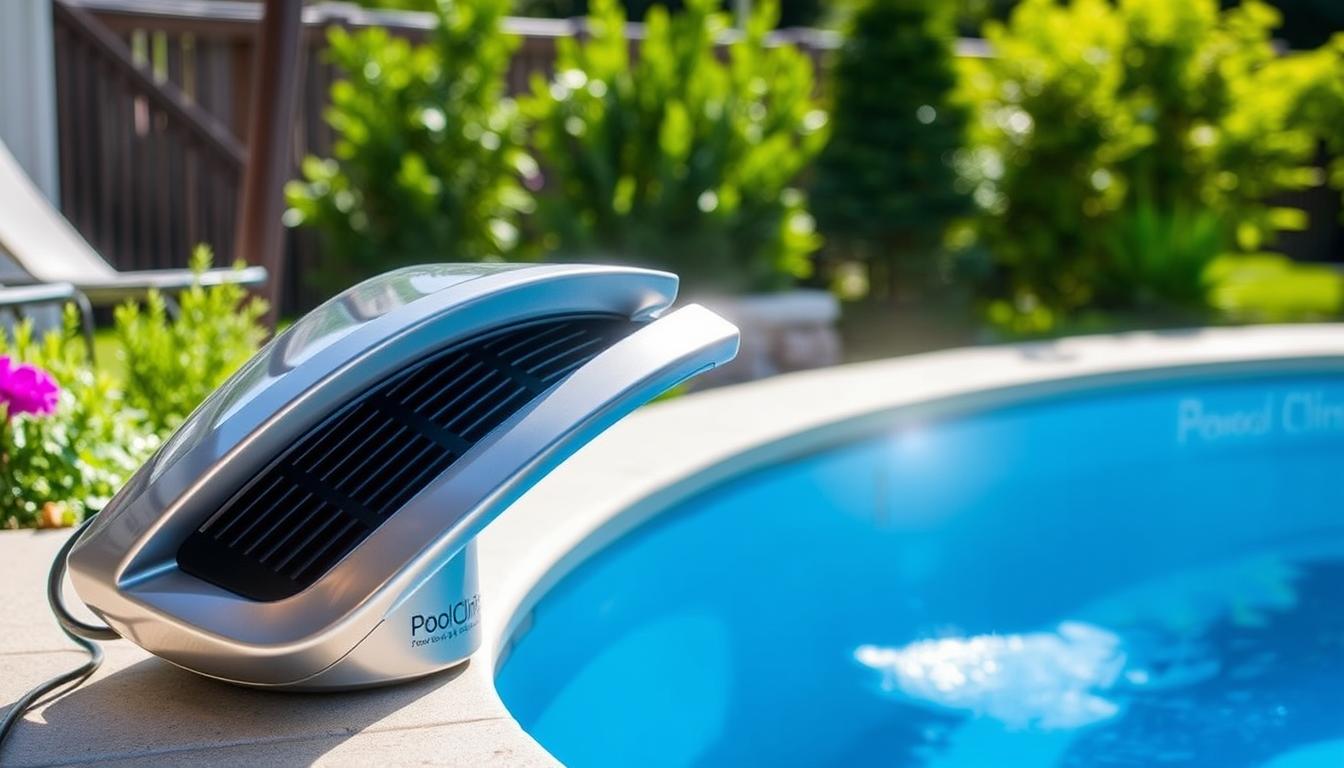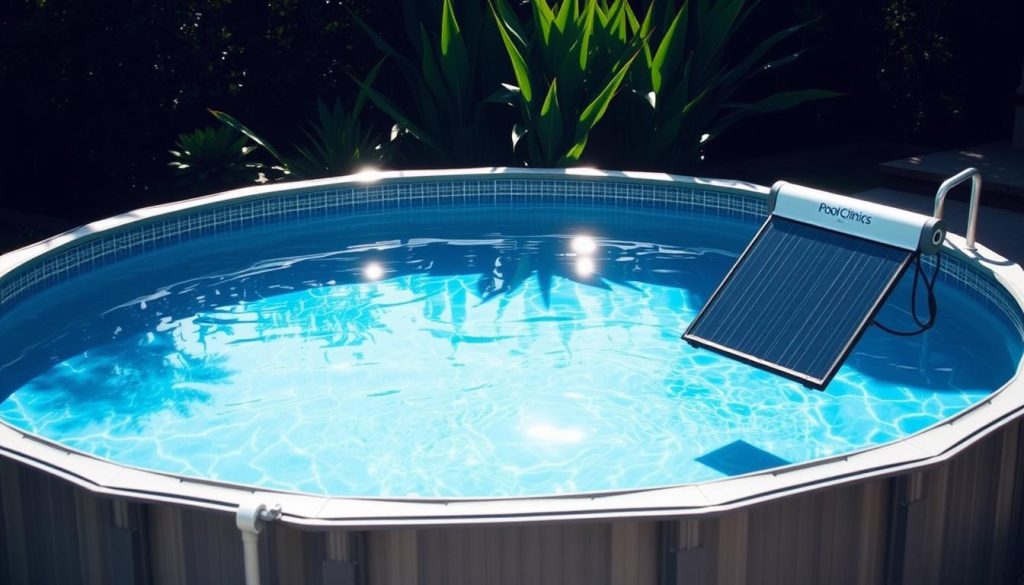
Pool owners often wish for more swim time as summer fades. The solution? Above ground pool heaters. These devices can extend your swim season into cooler months.
Imagine enjoying your pool as autumn leaves change color. A pool heater lets you create lasting memories. It helps you make the most of your investment.
There are many affordable heating options. Solar heaters use the sun’s power. Gas heaters provide quick, efficient heating. Electric heat pumps balance efficiency and cost.
Choose the right heater and maximize heat retention. Use a pool solar blanket for better results. This creates a warm, inviting swimming environment for your family.
Don’t let cool weather end your pool fun. An above ground pool heater keeps the enjoyment going. Make the most of your backyard swimming pool all year round.
Key Takeaways
- Above ground pool heaters can extend your swim season by several months
- Heating options include solar, gas, electric heat pumps, and pool solar blankets
- Proper insulation and pool covers enhance heat retention
- Affordable pool heating solutions are available for every budget
- Extending your swim season allows you to create lasting memories with family and friends
Understanding Your Above Ground Pool Heating Options
Several options exist for heating your above ground pool. Each has its own benefits and drawbacks. We’ll explore solar pool heaters, gas pool heaters, and electric heat pumps.

Solar Pool Heaters: Harnessing the Power of the Sun
Solar pool heaters are eco-friendly and cost-effective for above ground pools. They use the sun’s energy to heat your pool water. These systems include solar panels, a filter, pump, and flow control valve.
Solar pool heaters can save up to 70% on heating costs compared to traditional heating methods, with minimal operating costs since they rely solely on the sun’s energy.
Solar heaters cost between $2,500 and $9,500 upfront. They often pay for themselves within a few years. However, they need consistent sunlight to work well.
Gas Pool Heaters: Quick and Efficient Heating
Gas pool heaters are great for fast heating and flexibility. They use propane or natural gas to heat your pool. These heaters can raise water temperature quickly, often within hours.
| Gas Heater Type | Initial Cost | Operating Cost (per month) |
|---|---|---|
| Propane Pool Heater | $1,500 – $6,000 | $200 – $400 |
| Natural Gas Pool Heater | $1,500 – $6,000 | $200 – $400 |
Gas heaters offer quick heating but have higher running costs. Monthly expenses range from $200 to $400. They also have a larger environmental impact than solar or electric options.
Electric Heat Pumps: Balancing Efficiency and Cost
Electric heat pumps are efficient and eco-friendly pool heating options. They capture heat from the air and transfer it to the pool water. These systems offer precise temperature control.
- On/Off Heat Pumps: Basic models that operate at full capacity until the desired temperature is reached
- Semi-Inverter Heat Pumps: Provide some level of output adjustment for improved efficiency
- Full Inverter Heat Pumps: Offer precise control and maximum efficiency by continuously adjusting output to match the required heating level
Electric heat pumps cost between $2,500 and $7,500 upfront. They’re more cost-effective long-term than gas heaters. However, very cold weather can affect their efficiency.
Consider your budget, climate, and desired heating speed when choosing a pool heating method. This will help you make the best choice for your above ground pool.
Maximizing Heat Retention with Pool Solar Blankets
Pool solar blankets are essential for maintaining comfortable swimming temperatures in above ground pools. These covers capture sunlight, heat the water, and prevent heat loss. They can reduce pool heating costs by up to 70% and extend the swim season.
Solar covers come in various thicknesses and colors, offering different insulation levels. Clear and light-colored blankets warm pools more efficiently. The SunHeater Pool Solar Blanket, 12 mil thick, keeps water at 71-73°F on cold days.
The BigXwell heavy-duty cover, 16 mil thick, raised water temperature by two degrees in six hours. This shows its effective heat retention capabilities.
Solar blankets also reduce water evaporation, saving money on water and chemical costs. The Premium Plus Solar Blanket from In the Swim can increase water temperature by up to 15°F. It has the longest warranty, lasting up to 7 years.
“Using a solar cover has not only extended our swimming season but also significantly reduced our energy bills. It’s a must-have for any pool owner looking to maximize their pool’s potential.” – Sarah, a satisfied pool owner.
When choosing a solar cover, consider pool size, shape, and desired heat retention. The Robelle Heavy-Duty Blue Solar Pool Cover is only 8 mil thick. However, it comes in various shapes and sizes for different pool types.
Large blankets are easier to handle with a solar reel. Proper storage can extend the blanket’s lifespan, ensuring you get the most from your investment.
| Solar Cover | Thickness | Temperature Increase | Warranty |
|---|---|---|---|
| SunHeater Pool Solar Blanket | 12 mil | Maintains 71-73°F | Not specified |
| BigXwell Heavy-Duty Solar Pool Cover | 16 mil | 2°F in 6 hours | Not specified |
| Premium Plus Solar Blanket | Not specified | Up to 15°F | 7 years |
| Robelle Heavy-Duty Blue Solar Pool Cover | 8 mil | Not specified | Not specified |
A pool solar blanket is a smart investment for above ground pool owners. It reduces heating costs and prevents heat loss. With the right cover, you can harness sunlight to keep your pool warm and inviting.
Heater for Above Ground Swimming Pool: Choosing the Right Solution
Selecting a pool heater involves several key factors. Pool size, climate, usage frequency, and desired water temperature all matter. Larger pools need powerful heaters, while smaller ones can use compact units or solar covers.
Your local climate affects heater choice. Sunny regions benefit from solar heaters like Hayward or Pentair. Cooler areas may require gas heaters or electric heat pumps.
Consider how often you use your pool and preferred water temperature. Frequent swimmers or warm water lovers might need a powerful system. Gas heaters from Jandy or Pentair can quickly warm your pool.
Factors to Consider When Selecting a Pool Heater
To maximize heater efficiency and reduce costs, take these steps. Install a pool cover to minimize heat loss. Regularly maintain your heater by cleaning filters and checking for wear.
Heat your pool during off-peak hours when energy rates may be lower. Proper insulation of pool walls and floor helps prevent heat loss.
Implementing these tips and choosing the right heating solution ensures a comfortable swimming season. You’ll enjoy your above ground pool for longer periods throughout the year.
Tips for Efficient Pool Heating
At Leisure King, the Kayak Pool Guys, we’re experts in above ground pool heaters. We’ll help you find the perfect solution for your needs and budget.
Our team can guide you through options like gas heaters and solar covers. We consider your climate and pool usage habits to recommend the best choice.
Contact us today to create your ideal backyard oasis with a well-heated above ground pool. We’re here to make your swimming experience enjoyable all season long.







